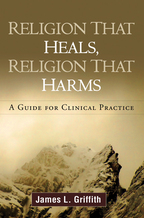Religion That Heals, Religion That Harms
A Guide for Clinical Practice
James L. Griffith
“Griffith...delivers precisely what his book's title promises. This is a well-balanced guidebook for clinicians across health-related fields who treat what Griffith terms 'religiously determined' clients or patients. The author deftly uses sociobiology and neurobiology to generate an interpretive framework for contextualizing and accessing a wide range of factors that can influence the roles played by religion (and more broadly by spiritual orientation) in human lives, as well as their unanticipated and sometimes potentially problematic consequences. In addition to professional clinicians, Griffith's book would reward students of mystical traditions, including specialists in spiritual direction, psychology of religion scholars, and those interested in cross-cultural comparisons....Griffith's convenient single volume provides an apt integration of current thought concerning science and healing, is enriched by relevant stories derived from recent clinical experience, and can serve as a practical resource for all sorts of healers and helpers. Recommended. Lower-level undergraduates through professionals/practitioners; general readers.”
—Choice
“Exploring the shadow side of religion, Griffith is frank about the religious and political engagements that motivate his work, and passionate in his commitment to mental health care that fully engages our humanity. With great skill and creativity, he reveals how religious and spiritual dilemmas, when confronted with clarity and compassion, may hold the keys to positive transformation. This work is courageous, clear sighted, and essential.”
—Laurence J. Kirmayer, MD, James McGill Professor and Director, Division of Social and Transcultural Psychiatry, McGill University
“This profound book reminds us that religion has been associated with not only the most impressive accomplishments of humankind, but also its darkest periods. Griffith provides a wealth of cross-cultural clinical examples in which religion serves as a foundation for psychopathology or self-harm. Yet he also explicates how personal spirituality and organized religion can provide paths towards recovery and equanimity. I highly recommend this book because of its philosophical depth, practicality, and uniqueness in the clinical realm. Griffith reminds clinicians of all faith orientations to give serious attention to our clients’ spirituality.”
—Barent W. Walsh, PhD, Executive Director, The Bridge of Central Massachusetts, Inc.
“This is a wise book, carefully crafted by a psychiatrist who is well acquainted with the empirical literature on the psychology of religion. Griffith avoids both naive apologetics and reductionism in providing insights into how to work with what he terms religiously determined patients, including those whose beliefs are distant from one's own. No simple answers are provided; rather the reader is gradually pulled into the guiding thread of the entire text—the importance of maintaining a therapeutic stance of neighborly respect, even when beliefs may be linked to psychological crises and potentially destructive behaviors.”
—Ralph W. Hood, Jr., PhD, Department of Psychology, University of Tennessee at Chattanooga
“An important, original book on a topic we face daily, in both our professional and personal lives. With flowing prose, Griffith mines complex areas of research—sociobiology, neurobiology, and attachment theory chief among them—to make crucial distinctions among benign and destructive religious beliefs and practices. After reading this book, clinicians will feel better equipped to engage in meaningful dialogue with patients for whom distinguishing between symptoms of mental illness and 'troubling but nonetheless normal' religious ideas and behavior is essential. The book’s blend of conceptual and clinical case material, along with practical suggestions, will appeal to graduate students as well as seasoned clinicians. This is a wise and compassionate book that will be a lasting reference.”
—Kaethe Weingarten, PhD, Department of Psychiatry, Harvard Medical School; Director, The Witnessing Project
Table of Contents
Introduction. When Religion Goes Bad: A Mental Health Problem?I. A Map for Navigating the Terrain of Religion
1. What Sociobiology Explains about Destructive Uses of Religion
2. What Neurobiology Explains about Destructive Uses of Religion
3. Setting the Stage: Opening Dialogue about Religious Life
4. Locating Personal Spirituality through Existential Inquiry
II. When Religious Life Propels Suffering
5. Seeking a Parent in God: Clinical Problems from Insecure Attachments
6. Seeking Security within the Flock: Clinical Problems from Social Hierarchy, Peer Affiliation, and Reciprocal Altruism
7. Asserting Primacy of Personal Spirituality over Sociobiological Religion
8. The Religious Who Protect Only Their Own: Clinical Problems from Peer Affiliation, Kin Recognition, and Social Exchange
III. When Mental Illness Infiltrates Religious Life
9. Religion That Is a Voice for Mental Illness
10. Dark Nights and Exaltation: Religion Distorted by a Mood Disorder
11. Worlds Confused: Religion Disorganized by Psychosis
12. Fear and Dread: Religion Shrunken by an Anxiety Disorder
IV. A Clinician’s Stance
13. Finding a Place to Stand: Conversing with Religiously Determined Patients
